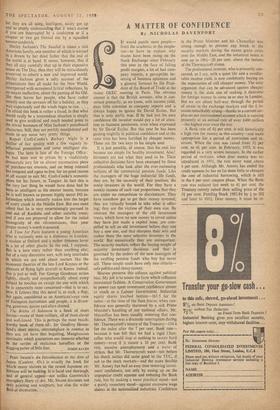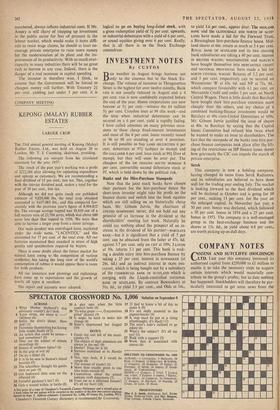A MATTER OF CONFIDENCE
By NICHOLAS DAVENPORT Jr would puzzle most people— from the academic to the simple- ton—to have to explain why shares have been rising on the Stock Exchange since February this year in the face of falling profit margins, a lot of bad com- pany reports, a perceptible les- sening of business optimism and a gloomy forecast by the Presi- ,L• dent of the Board of Trade at the recent OEEC meeting in Paris. The obvious answer is that the British investor, who is con- cerned primarily, as we know, with income yield, pays little attention to company reports and is always happy to ignore Sir David Eccles. But that is only partly true. If he had lost his own confidence the investor would pay a lot of atten- tion to business pessimism, even when expressed by Sir David Eccles. But this year he has been gaining mightily in political confidence and at the same time has been fortified by cheaper money. Those are the two keys to his simple soul.
It is just possible, of course, that his soul has become too simple for healthy investment. Alas! Investors are not what they used to be. Their collective decisions have been swamped by those professionals who look after the ever-increasing millions of the commercial pension funds. Like the managers of the huge industrial life funds, they are, by the necessity of their position, the worst investors in the world. For they have a weekly income of such vast proportions that they are under no compulsion to discriminate. They have somehow got to get their money invested; they are virtually bound to take what is offer- ing; they are the victims of their own size. By contrast the managers of the old investment trusts, which have no new money to invest unless they have just made a capital issue, are com- pelled to sell an old investment before they can buy a new one, and that sharpens their wits and makes them the most selective investors in the world. But numerically they are unimportant. The security markets reflect the buying weight of majority investment decisions and that is governed by the orders of the new managers of the swelling pension funds who buy but never sell. These simple souls have only two criteria— safe politics and cheap money.
Heaven preserve this column against political bias. My job is'to assess the facts which influence investment fashion. A Conservative Government in power can upset investment confidence almost as much as a Labour Government. Industrial equity shares touched bottom-161.5 for the index—at the time of the Suez fracas, when con- fidence was generally shattered by a sick Prime Minister's handling of our national affairs. Mr. Macmillan has been steadily restoring that con- fidence. There was a dramatic interruption during Mr. Thorneycroft's tenure of the Treasury-154.4 for the index after the 7 per cent. Bank rate— because it was felt that we had a rigid Chan- cellor who would stop at nothing to secure hard money—even • if it meant a 10 per cent. Bank rate, massive unemployment and a wave of strikes. But Mr. Thorneycroft went—not before his shock tactics did some good to the TUC, if not to the stock markets—and the more flexible Mr. Amory has had an easy time restoring invest- ment confidence, not only by easing up on the unpopular credit squeeze and reducing the Bank rate, but by making a more practical stand—not a purely monetary stand—against excessive wage claims in the nationalised industries. Confidence
in the Prime Minister and his Chancellor was strong enough to prevent any break in the security markets during the recent grave crisis over the Middle East, and the industrial index is now up to 186+-20 per cent, above the bottom of the Thorneycroft slump.
The professional investor, who is primarily con- cerned, as I say, with a quiet life and a comfor- table income yield, is now confidently buying on the expectation of still cheaper money. The only argument that can be advanced against cheaper money is the stale one of making it desirable for foreign money to come to or stay in London. But we are about half-way through the period of strain in the exchange markets and the re- mains remarkably strong—thanks to a current sur- plus on our international account which is running presently at an annual rate of over £400 million —the highest ever since the war.
A Bank rate of 41 per cent, is still historically a high rate for money in this country—and more appropriate for a period of restriction and re- straint. When the rate was raised from 3+ per cent. to 41 per cent. in February, 1955, it was regarded as a very severe measure. In the earlier period of restraint, when dear money was re- introduced in 1951, the rate never went above 4 per cent. Although Mr. Amory has ended the credit squeeze he has so far done little to cheapen the cost of industrial borrowing, which is still in the 6 per cent, coupon phase. When the Bank rate was reduced last week to 4+ per cent. the Treasury merely raised their selling price of the 5+ per cent. Funding Stock 1982-84 by * to 101 and later to 101*. Dear money, it must be re- membered, always inflates industrial costs. If Mr. Amory is still chary of stepping up investment in the public sector for fear of pressure in the labour market, which would make it more diffi- cult to resist wage claims, he should at least en- courage private enterprise to raise more money for the modernisation of its plant and the im- provement of its productivity. With so much over- capacity in many industries there will be no great rush to borrow in any case. Indeed, there is the danger of a real recession in capital spending.
The investor is therefore wise, I think, to assume that the Government will be forced to cheapen money still further. With Treasury 24- per cent. yielding just under 5 per cent, it is logical to go on buying long-dated stock, with a gross redemption yield of 54- per cent, upwards, or industrial debentures with a yield of 6 per cent., or sound equities giving over 6 per cent. Really, that is all there is to the Stock Exchange conundrum.































 Previous page
Previous page